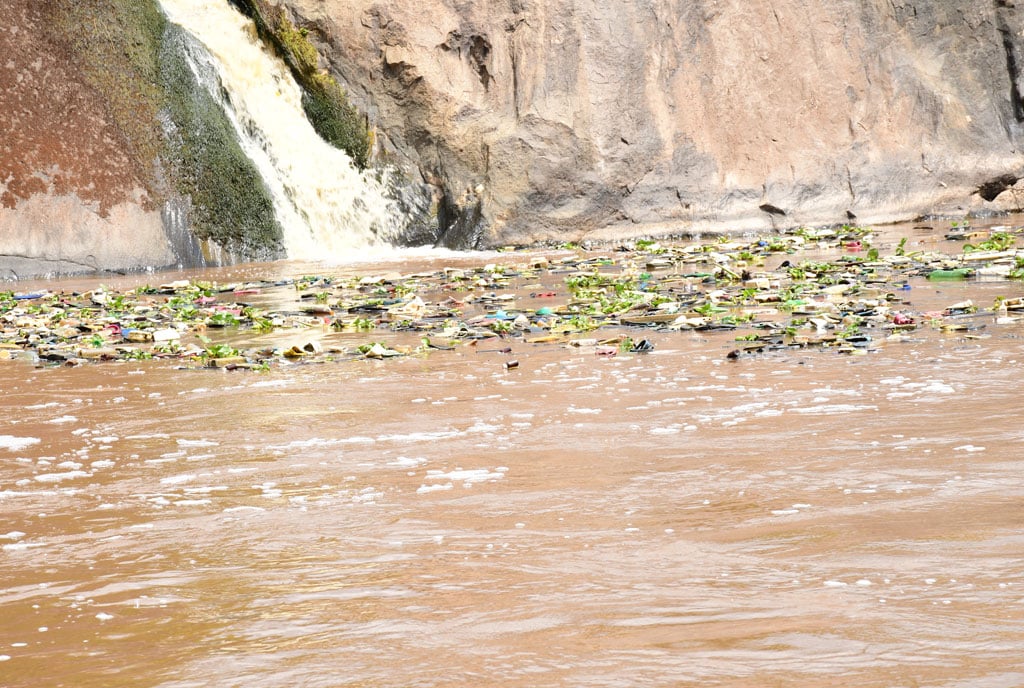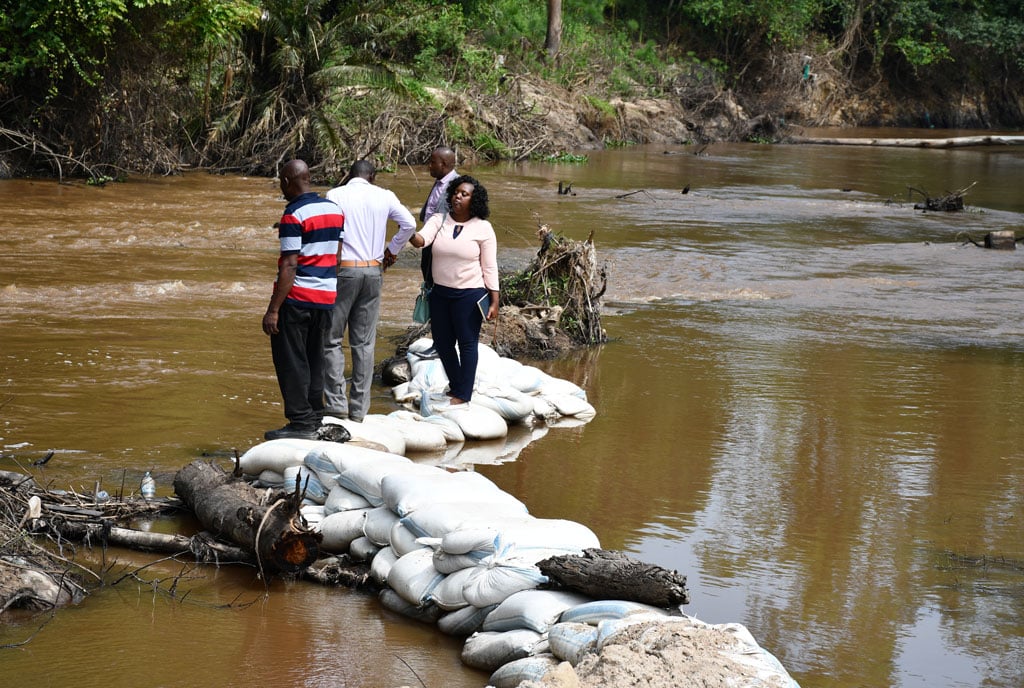Prime
Rwizi: A river on the brink of extinction

Eucalyptus trees planted along the Riverbanks in Mbarara City South division.
What you need to know:
- Population increase and urbanisation are some of the reasons for increasing pressure on the river and its catchment.
The River Rwizi has been the main source of water for millions of residents in 14 Western Uganda districts.
The river, which covers approximately 8,200Km, stretches from the hills of Buhweju District through Sheema, Rwampara, Ntungamo, Mbarara, Kiruhura, Isingiro, Mbarara City, Lyantonde, Lwengo, Kyotera before draining her waters into Lake Victoria.
Over the years, however, residents of these districts have witnessed River Rwizi water levels reduce, which has affected both its quality and quantity.
This is blamed on encroachment through a host of human activities which include farming, sand mining, brick making and construction.
The districts of Sheema, Rwampara, Ntungamo and Mbarara are endowed with alluvial deposits that contain sand, which is highly sought after by construction industry while Buhweju, the source of the river has gold deposits.
Sand deposits are largely in areas of Nyeihanga, Rugando, and Kinoni in Rwampara and Ngoma in Sheema district. These activities have affected wetlands and swamps around these areas that would be the granaries of water for the river.
Growing industrialisation in Mbarara City has contributed to increasing plastic waste released into the river.
What is left of it now is a stream, according to Mr Ezekiel Kabandize, 70, a resident of Katete, Mbarara City South division.
“Growing up, we never thought of getting close to its banks because many people had drowned due to the huge volume of water. However, as you can see, we can now cross from one end of the river to another on foot. Even children comfortably wade through especially in the dry season,” Kabandize, who has lived close to the river for 40 years, says.
Mr Kabandize blamed local leaders for failing to control human activities around the riverbanks.
“There is sand mining in the river, banana plantations have sprung up on the riverbanks and yet authorities are silent, when some of them have offices just a few kilometers away,” he said.

Plastic waste floats on top of River Rwizi in Mbarara City South Division.
Other residents allege that most part of the river catchment has been encroached on by the rich and turned into farmlands and factories.
“The rich people are the biggest encroachers but when the issue is raised, we are threatened,” Mr Abel Bwengye, a resident of Rweibogo in Bugamba Sub- County in Rwampara District said.
On the other hand, the former National Environmental Management Authority (NEMA) official in charge of Southwestern region, Mr Jeconious Musingwire, says population increase and urbanization are some of the reasons for increasing pressure on the river and its catchment.
“The population has increased and people have poorly managed the land while growing urbanization is also making people encroach on fragile ecosystems,” he said.
Alarming
Mr Didas Magyezi, the in-charge of Kabale Road National Water and Sewerage Corporation (NWSC) plant, says the water levels at the river have reduced drastically from 6.5 meters during the rainy season to half a meter in the dry season.
“In dry season, we have intermittent levels but when the rains are high the water rises to six meters. Last April, they reached 6.5 meters which was the highest but currently, it has dropped to less than a meter. That is the rate at which the river is drying,” he said.
His colleague, Naboth Mwebaze, the in-charge of water quality at Kabale Road NWSC plant says due to human activities at the riverbanks, the water is highly contaminated which increases the cost of treatment.
“The water is highly contaminated with silt, some minerals, industrial influences that are discharged into the river as well as Non-biodegradable substances such as plastics, polythene bags, from the urban centers,” he said.
What should be done?
The Country Director, Worldwide Fund for Nature (WWF), Mr Ivan Tumuhumbise, says no person should be left behind in ensuring that plastic pollution is ended because ‘every bottle of water and soft drink we drink and dispose of it in irresponsible manner, consequently ends up in our river and subsequently polluting our water.’
He added “Every action, we do especially agricultural production and other related activities that we do upstream consequently destroys the river.”
Mr Tumuhimbise says to save the river, stakeholders should make sure that whatever pollution has happened, should be the last and then work on addressing what has been destroyed so that both actions of individual members and organisations are tamed.
“Some of the actions are done by individuals and so, we want to build a culture of taking River Rwizi seriously. Factories that produce single use plastics should find a way of using reusable materials,” he says.

National Water and Sewerage Corporation officials stand on sandbags that have been put in the River Rwizi to rise water volumes.
Chairman River Rwizi Catchment Committee, Mr JB Tumusiime Bamuturaki, says saving the river should not be an activity aligned to the government only but rather it should be multi-sectoral.
“Everybody should feel concerned about this river. It is not only for the City of Mbarara. It covers 14 districts and where are we heading without this dependable and permanent source of water, we shall not grow, we shall not have factories or water for production,” he said.
He said the river catchment committee has directed every district representative through which the rivers flows to give a report quarterly on what is being done to save the river.
“We have given ourselves a timeframe as districts covering River Rwizi to tell the people what has been done or secured. We do not have much in terms of resource envelope but communities in these districts have not profited from the sand trade, save for the casual jobs, which fetch them just enough money to survive,” he said.
Efforts made so far
In a bid to save the river from plastic and polythene contamination, Abahumuza Development Group, a Non-governmental organization in Mbarara has started to build waste bankers in Mbarara City where polythene papers and plastics are disposed of to stop contaminating the river.
“Our aim is to create awareness on the status of degrading environment in Mbarara with a specific focus on River Rwizi. As you know river Rwizi is the only strategic source of water we have in Ankore region,” Mr Ramathan Kimbugwe, the programmes director at Abahumuza Development Group in Mbarara City told Daily Monitor.
Mr Kimbugwe said they have partnered with recycling agencies to construct plastic waste bankers in Mbarara to help locals dispose the waste without throwing it in the River.
“The plan is to construct 200 plastic waste bankers within the City and each has the capacity of collecting 75kg of waste. If they are emptied after two weeks, you have 15 tons of plastic collected in a month and that is 360 tons of plastic annually within the City. We think if this is done well at a local level then we can spread it to other areas and Cities,” he said.
Plastic Waste Management Bankers are pits built by experts using bricks and Cement for locals to dispose of their plastic and polythene waste.
Mr Musingwire says although there have been several interventions to save the river including restoring the degraded catchment, they have not registered a substantial impact, because of limited funding that affected enforcement and implementation of the law.
River Rwizi will dry up in the next 10 years, NWSC
The National Water and Sewerage Corporation (NWSC) General Manager Mbarara, Mr Dennis Muramuzi, warned that River Rwizi will dry up in the next 10 years if the residents do not protect the environment.

Abahumuza Development Group in Mbarara hands over plastic waste banker to residents of Kashanyarazi in Mbarara City South Division on September 14, 2023. PHOTO/FELIX AINEBYOONA
Over the years River Rwizi has been the sole source of water for both domestic and industrial use for Mbarara but dwindling water levels are worrying authorities.
Mr Muramuzi says they continue to face challenges in extracting water from the river to serve more than 200,000 people with clean and safe water because of continued encroachment on River Rwizi banks.
“In a rainy season, all get marram, sweet potatoes, bananas because the river flows through banana plantations on its banks and that affects the quality of water. In the dry season, we end up using a lot of chemicals which affects our cash balance because all those chemicals are imported,” he said.
He asked leaders at all levels to sensitize the public about the need to protect wetlands, swamps that feed the river with water for sustainable water supply.
“We need 20m liters of water per day to supply the whole of Mbarara. During dry spells we usually experience low levels of water volumes. Now we are scared that in the future, five to 10 years from now, it might completely dry off,” he said.




